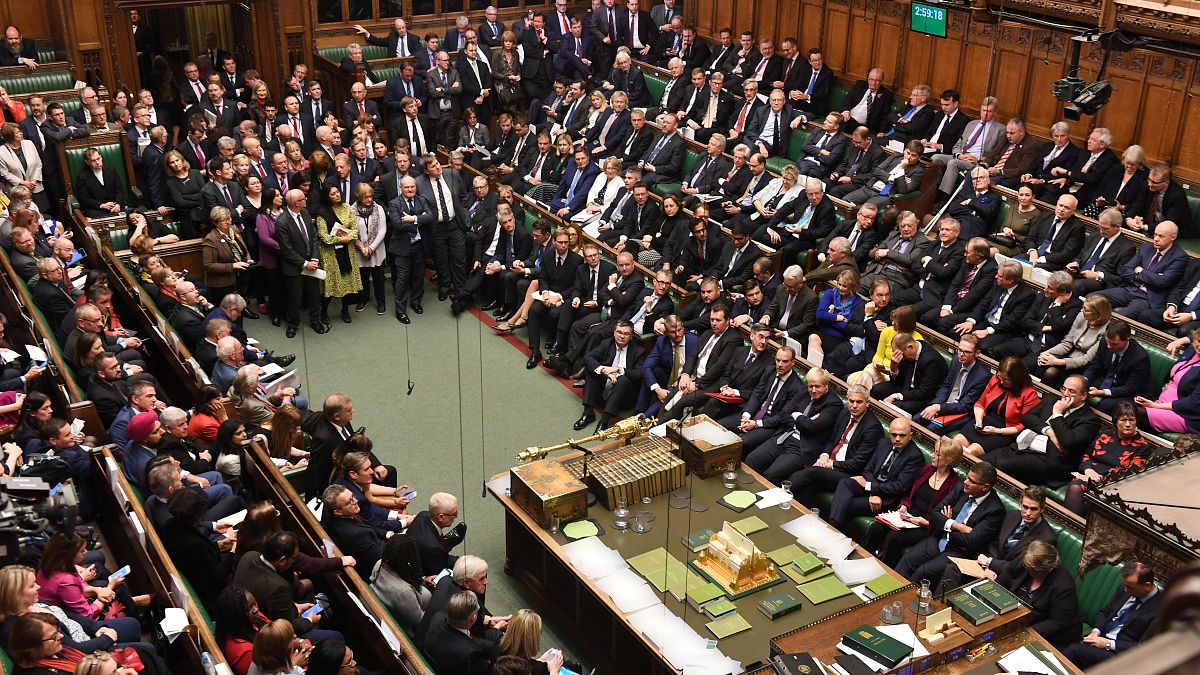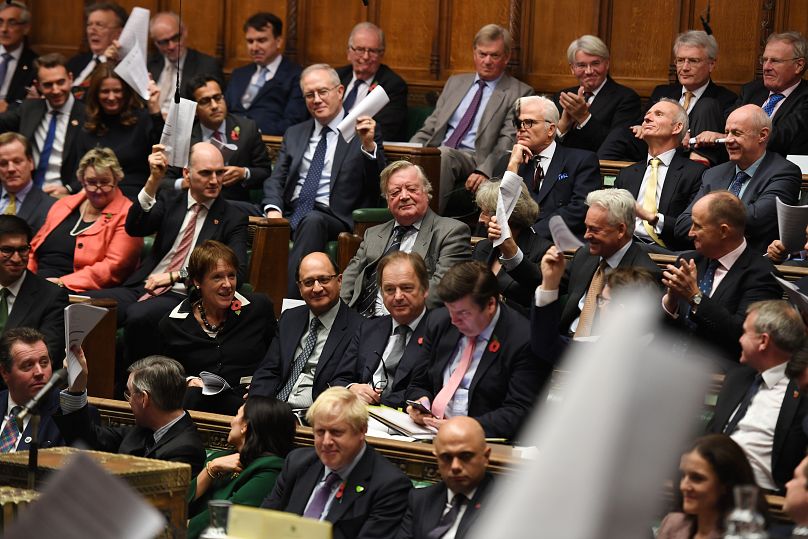A quarter of British MPs not seeking re-selection have complained of a toxic atmosphere in parliament and politics.
This article originally published on November 3 has been updated.
A quarter of the dozens of British lawmakers standing down before December’s general election have complained explicitly in resignation statements about a toxic atmosphere in parliament, or in politics generally.
Two MPs – both women – specifically cited the abuse and threats they have endured as a principal reason for deciding not to seek re-election.
Many others have clashed with or left the party they stood for, in come cases as recently as 2017, or have denounced a climate of intolerance. It is clear that intimidation including death threats, divisions over Brexit, party splits and a sense that politics is "broken" have all emerged as key characteristics of the last parliamentary session.
By Thursday (November 7), more than 70 politicians had announced they would be standing down – more than 10% of the total number of MPs.
Of those, more than 20 are women. This is broadly in line with the proportion of women in parliament as a whole (32%). However, unlike many of their male counterparts retiring after long careers, several women are calling time after relatively short periods as MPs.
Among the latest to declare she is quitting, Conservative MP Margot James, cited Brexit and opposition to her stance from within her constituency association.
She has since been followed by some of Britain's most prominent politicians – including the last Conservative chancellor (finance minister) Philip Hammond, and the opposition Labour Party's deputy leader, Tom Watson. Both had strongly contested the directions their parties were taking.
Time spent as an MP by those quitting varies widely: Scottish Tory Bill Grant will only have served two years in parliament, having promised to complete only one term, whereas the Father of the House Kenneth Clarke has clocked up almost half a century in the House of Commons.
Euronews has examined the reasons given by those who have decided to call it a day.
The above chart is based on information available up to Sunday November 3.
‘Quite frankly we’ve had enough’
The two women to link abuse most directly to their decision to stand down were both elected as Conservatives in 2015.
Heidi Allen, who left the Tories earlier this year and is now a Liberal Democrat, announced this week that she was leaving parliament.
“I am exhausted by the invasion into my privacy and the nastiness and intimidation that has become commonplace,” she wrote in a letter to her constituents.
“Nobody in any job should have to put up with threats, aggressive emails, being shouted at in the street, sworn at on social media, nor have to install panic alarms at home.
“Of course public scrutiny is to be expected, but lines are all too regularly crossed and the effect is utterly dehumanising.”
Tory MP Dame Caroline Spelman has taken a high-profile stance against a no-deal Brexit. Fearful for thousands of jobs in their constituencies, earlier this year she joined forces with Labour’s Jack Dromey to try to force a delay to the UK’s exit from the EU if there was no agreement.
“Myself, my family and my staff, have borne an enormous brunt of abuse and I think quite frankly we’ve had enough,” she said when announcing her decision to stand down in September.
“The anonymity of the internet allows people to say things which if they said it to your face or they wrote it down, would not be legal.”
Violent threats ‘commonplace’
A recent parliamentary report found that violent threats against MPs had become “commonplace,” while an Amnesty International report from December 2018 found that 7.1% of tweets to female journalists and politicians (in a study of 228,000 tweets) contained abusive or problematic language.
Catherine Anderson, chief executive of the Jo Cox Foundation – named after the Labour MP murdered in 2016 – told the Press Association: “One of Jo’s great passions was encouraging more women to come forward as candidates, so it is very sad to see talented women standing down at this time.”
She added that “while abuse and intimidation directed at those in public life is always abhorrent”, evidence collected by the foundation showed “women are disproportionately more likely to be targets”.
“We all have a responsibility to call out threats and unacceptable behaviour, whether online or offline,” she said.
At least 14 politicians who are now standing down – nine men and five women – have cited the toxic nature of today’s politics in statements explaining their decisions, even though this was not given as the primary reason for their departure.
Here is a selection of their comments:
- Nicky Morgan (Con) cited the impact on her family and “the abuse for doing the job of a modern MP".
- Alan Duncan (Con) said the job was now “coarser and ruder” than when he became an MP in 1992.
- David Lidington (Con), former deputy prime minister, tweeted to complain of “the abuse which disfigured national political debate”.
- Sir Nicholas Soames (Con) said parliament had become a “rougher, coarser place”.
- Mark Field (Con) condemned a “fractious, febrile and deeply divisive aftermath to the EU referendum in 2016”.
- Sir Norman Lamb (Lib Dem) described today’s politics as “in a very sad and disturbing place”.
Alia Middleton, a politics lecturer at the University of Surrey, told Euronews it was difficult to pin down factors such as intimidation and abuse as the reason for the departure of dozens of politicians at this year’s election.
“I think it is difficult to get something tangible on whether there are greater numbers of MPs leaving because they can’t hack it, as there have always been those for whom politics has been more brutal, more difficult, less interesting than they expected,” she said. “Maybe what we are seeing in 2019 is MPs are more comfortable in vocalising this?”
Other politicians who are standing down have described their parliamentary experience as thoroughly rewarding. At least one contests the idea that today’s political atmosphere has reached an all-time low.
Welsh MP, Conservative Glyn Davies, said he had only good memories of his three parliamentary terms. “People are talking about the nastiness of being an MP at the moment but there have been worse times, such as during the miners’ strike. That was a really bad time,” he told the Shropshire Star.
A ‘broken parliament’
Several departing politicians refer to the parliamentary stalemate that has produced three delays but no definitive outcome over Brexit, nearly three and a half years since the referendum.
“Brexit has broken our politics,” Heidi Allen wrote in her resignation letter. “While parliament has been in purgatory, we have legislated for almost nothing, changed almost nothing and improved almost nothing. I became an MP because I wanted to make a difference, but while Brexit continues to captivate parliament, that just hasn’t been possible.”
Former Conservative minister and leadership candidate Rory Stewart told ITV Border: “The reason I’m stepping down is … because of this place [parliament]. I think that it’s, unfortunately, becoming a pretty outdated, inefficient institution.
"I think it’s a talking shop, people don’t listen very much, they find it very difficult to get stuff done. I felt in some ways quite ashamed. I felt I wasn’t able to represent people in the way that I wanted or respond as well as I would have liked to local concerns.”
Conservative MP Nick Hurd had previously stated that he intended to serve “for as long as my constituents continued to elect me” – but his announcement in August that he was standing down read: “politics is now dominated by the ongoing division over Brexit”.
Intolerance and party splits
At least 12 of those standing down – a fifth of the total – are no longer in the party they stood for in 2017. Several more are still in the fold, but since the last election, have clashed with their party leadership over policy, especially on Brexit.
Among the Conservatives, Jo Johnson – the prime minister’s brother – announced in September that he was leaving politics at the next election, saying he was “torn between family loyalty and the national interest” and describing an “unresolvable tension”.
Sir Nicholas Soames wondered what his grandfather Winston Churchill would have made of the extent to which Boris Johnson’s government aims to cut loose from the EU.
“I think he would have been surprised that Britain, that has always been a country that played a very big role in the world, would throw in all its chips with America, separate itself from an enormous market and… a still very influential European Union, and start to make its way alone in the world,” he told the BBC. “Why you would disconnect it in a very big way, I think he would have found puzzling.”
Another outgoing Tory MP, Mark Prisk, lamented “the rise of narrow ideology over pragmatic, common sense”.
However, the opposition Labour Party has also had its share of internal strife. Fundamental divisions over Brexit have led to criticism that its policy is at best ambiguous, while the party has been plagued by accusations of anti-Semitism.
Read more: Labour deputy and Corbyn critic Tom Watson standing down as MP
Louise Ellman, who is Jewish, resigned from the Labour Party in October after 55 years. “Under Jeremy Corbyn’s leadership, anti-Semitism has become mainstream in the Labour Party,” she wrote in her resignation letter. “Jewish members have been bullied, abused and driven out. Anti-Semites have felt comfortable and vile conspiracy theories have been propagated.”
“The lack of tolerance for different viewpoints in the Labour Party frankly worries me,” Gloria de Piero said, when announcing her decision to stand down in July. “When I hear people being called right-wing in the Labour Party I find it utterly offensive.”
Helen Jones, who confirmed this week her decision not to stand again, has written recently that women Labour MPs face a culture of “bullying and harassment in their constituency parties”.
Are more politicians standing down than before?
The number of politicians who have announced they are standing down is far fewer than the 149 who quit ahead of the 2010 election, in the wake of the previous year’s expenses scandal.
But this election comes just two and a half years after the last one in June 2017 – and the number of MPs voluntarily leaving their jobs is double the 30 politicians who stood down then, two years after the previous election in 2015.
The 2015 election saw 90 MPs stand down, five years after the previous vote. In the four and a half years since then, that tally has now been surpassed.
“To put this into context, [the number] standing down at this election is far more than I would expect,” Middleton told Euronews. “The largest group of these are those first elected in 2010. So it would be true to say that we are seeing MPs leaving the Commons in 2019 at an earlier stage of their career than in previous elections. This also means that these are often prominent figures.”
Looking ahead, she predicted a period of political instability and uncertainty – which she said may have played a role in some MPs’ decisions to quit.
“I think some of the MPs stepping down are doing so due to the uncertainty about whether they can win their seat. The uncertain political times mean that the normal rules about who is safe and who isn’t may not apply. And I think there is a deep desire for an MP to step down rather than run the risk of an undignified exit on a stage on election night.”
Read more:

